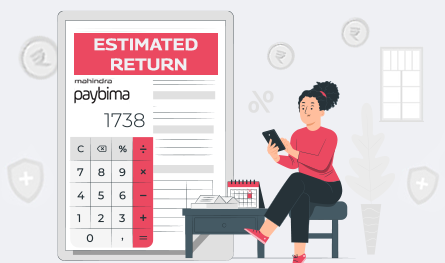SBI Annuity Deposit Scheme Calculator – Interest Rates, Eligibility, & more
Retirement is a time when the regular flow of money stops coming in. Hence, people buy annuity plans for their retirement. Let’s understand the SBI Annuity Deposit Scheme Calculator 2024 to evaluate your future expenses better.
- Annuity Deposit – An Overview
- Types of Annuity investment plans
- SBI Annuity Deposit Scheme Features
- SBI Annuity Scheme Components
- SBI Annuity Deposit Scheme Eligibility Criteria
- Benefits of the SBI Annuity Scheme
- Interest rate of SBI Annuity Deposit Schemes
- Why Are Annuity Calculators Used?
- How to use SBI Annuity Deposit Scheme Calculator?
- Benefits of the Calculator
What is an Annuity Deposit Scheme?
An annuity is like a fixed payment that an investor receives every month from an annuity deposit scheme over a certain time period. In return of the regular pay, the investor has to invest a lump sum initial payment to the annuity account or make payments in installments as per convenience.
The interest under this plan, which is called diminishing interest on principal, as well as the principal amount is returned to the investor in the form of regular monthly annuity. Investors generally invest on the annuity plans to support them later in life when they are retired. The annuity payout may serve as pension once the investors retire and hence annuities mostly last for lifelong.
There are several Annuity Investments Plans available in the market that an investor can choose to invest on.
6 Different Types of Annuity deposit scheme
Below are some of the various Annuity Investment Plans that an investor can choose from:
Lump-Sum Annuity – Here the investor receives the entire annuity amount in lump sum
Periodic Annuity – The investor receives regular flow of income as periodic instalments, such as monthly payout or payout received after a period of time
Immediate Annuity – Here the annuity is paid to the investor immediately after he/she makes the initial lump sum payment
Deferred Annuity – This annuity comes in two phases – accumulation and payout. The plan first accumulates the investment amount for a certain period of time and offers incremental repayment later
Fixed Annuity – Under this annuity plan, the payout is fixed and remains same throughout the payout period
Variable Annuity – This is the riskiest annuity plan which depend on market conditions
Features of the SBI Annuity Deposit Scheme
Below are some features of SBI Annuity Deposit Schemes:
The scheme allows investors to start the policy with a minimum deposit amount of INR 25,000
It is easily accessible across all Indian branches except for the ones that allow specific credit intensive
The interest offered under the scheme is the same as that of a term deposit
Further benefits are offered for provided to ex -employees of SBI in the form of 1% payable interest above the applicable rate
The scheme can be transferred in any SBI branch across India, whereas the nomination facility can also be accessed easily by issuing the universal passbook
Eligibility for the SBI Annuity Deposit Scheme
Anyone including minors can have SBI Annuity Deposit Scheme who can hold the account individually or jointly with anyone else. However, NRE and NRO are not eligible for this scheme.
An Indian Resident individual (can also be minor).
The investor can be holding a Single or Joint Account.
NRIs with NRE or NRO Accounts are not eligible.
Components of the SBI Annuity Scheme
| Component | Details | ||
| Premature payment | The scheme allows premature payment in case of death of depositor for which the concurrence of the legal nominees of the deceased is required | ||
| Loan facility |
|
||
| Interest rate | The account provides a return that is comparable to other term returns of SBI. | ||
|
|
||
| Eligibility | All Indian citizens are eligible including minors. | ||
| Taxes on earned interest | The interest offered is as per the TDS in annuity deposits |
Benefits of the SBI Annuity Scheme
Here are some benefits of SBI Annuity Scheme:
The scheme allows varied options in terms of tenure of policy and maturity. An investor can choose from different alternatives if they want flexible tenure ranging from few days up to 10 years
The payment of the annuity ensures a safe lock-in period and is made in advance after the depositor is no more
There is no upper deposit limit under this scheme
The scheme allows up to 75% loan facility of the total amount
SBI Annuity Deposit Scheme Interest Rates 2024
Let’s take a look at the annuity interest rates of the SBI Annuity Deposit Scheme as recorded for the mentioned period of investments:
|
Interest Rates for General Citizens | Interest Rate for Senior Citizens | ||
| 7-45 Days | 3.00% | 3.50% | ||
| 46-179 Days | 4.50% | 4.40% | ||
| 180- 210 Days | 5.25% | 5.75% | ||
| 211 Days-1 Year | 5.75% |
|
||
|
|
7.25% | ||
|
6.75% | 7.25% | ||
|
6.25% | 6.75% | ||
|
6.25% | 7.25% |
Note: Interest rates as of 24th January 2023.
FD Rates Comparison for Different Banks in India
| Name of bank |
|
|
||
| Axis Bank | 6 months – 5 years | 5.75% – 7.00% | ||
| Bank of Baroda | 3 months – 10 years |
|
||
|
3 months – 10 years | 4.50% – 6.00% | ||
| Bandhan Bank | 3 months – 10 years | 3.00% – 7.85% | ||
| Canara Bank | 3 months – 10 years | 5.50% – 6.70% | ||
| Co-operative Bank |
|
6.00% – 6.35% | ||
| DBS Bank | 3 months – 10 years | 3.00% – 6.50% | ||
| Equitas Bank | 7 days – 10 years |
|
||
| HDFC Bank | 3 months – 10 years | 4.50% – 7.00% | ||
|
3 months – 10 years | 4.50% – 6.90% | ||
|
3 months – 20 years | 4.50% – 4.80% | ||
|
3 months – 10 years | 3.50% – 6.10% | ||
|
3 months – 10 years | 4.50% – 6.50% | ||
|
|
7.25% – 7.75% | ||
|
3 months – 10 years |
|
||
|
|
6.90% – 7.50% | ||
|
3 months – 20 years | 4.75% – 7.00% | ||
|
3 months – 10 years | 3.00% – 6.50% | ||
|
3 months – 10 years | 4.50% – 6.10% | ||
|
3 months – 10 years | 3.00% – 6.70% | ||
| Yes Bank | 3 months – 10 years | 4.75% – 7.00 % |
Why Are Annuity Deposit Calculators Used?
Annuity Deposit Calculators are used to calculate the premiums of annuity plans. The SBI Annuity Scheme Calculator is an online tool that is used to evaluate the premiums of annuity plans offered by SBI. This makes it easy to compare various plans and buy the one that suits you best.
Also, most annuity schemes allow a regular and steady source of income after retirement. By using the SBI Annuity Plan Calculator, you can determine the sum that an individual might have to pay to ensure a worry-free retirement.
The best thing about the SBI Annuity Calculators is that they offer accurate results and they are quick and easy to use. The online tools help in solving the complex calculations and support an investor to take better financial decisions.
5 Benefits and Need of SBI Annuity Deposit Calculator
Below are some of the benefits of using the SBI Annuity Deposit Scheme Calculator:
This is a digital tool available freely online and can be used at the convenience of the investor
SBI Annuity calculator can be operated easily and in a hassle-free manner
The calculator offers accurate calculations and can be used as many times as required by the investor
The calculator helps investors in getting a clear picture of the investment that they need to make to receive a guaranteed amount for their retirement in the future
With the SBI Annuity Calculator, the investor can save from the tedious task of making manual calculations to ensure investment possibilities.
How to use SBI Annuity Deposit Scheme Calculator 2024?
It is very easy to use the SBI Annuity Deposit Scheme Monthly Income Calculators and that is the reason why these calculators are so popular among investors. Anyone can use these calculators that are freely available on the official website of the company. These calculators can be used anytime and as many times as you want.
Here are the steps that can be taken to use the SBI Annuity Deposit Scheme Calculator 2024:
Visit the official website of the company and click on the tab of ‘Annuity Plus’
Now, go to the ‘Premium Calculation’ button and click on it
Next step is to add personal details like investor name, email id, mobile number, gender, etc.
The investor might also have to inform if the person wants to buy annuity for one or two people
The next step is to submit annuity details such as, if the insured wants to pay the investment as a lump sum amount or in the form of installments
Now, go to the ‘Calculate Premium’ tab and click it
You can see the premium amount that is required to pay for purchasing the annuity on the page displayed in front of you
Based on the premium amount, the investor can decide if he/she wants to purchase the annuity plan. In case the investor wants to go with the plan, the person is required to enter his/her complete details
Once the plan is fixed, the investor can submit the annuitant details, such as the name of the policyholder. The policyholder can be the purchaser of the annuity policy or a person who is the beneficiary of the plan
As a final step, the investor must pay the investment via online mode to complete the purchase
Further, in case of any doubt or confusion, the investor may dial the SBI toll-free helpline number – 1800 267 1800 during 8.30 am to 9.30 pm
Read More: What is an Annuity? What are its Benefits and Different Types of Annuities?
Important Things to Consider at the Time of Buying SBI Annuity Deposit Plan
If you are planning to buy the SBI Annuity Deposit Plan, here are the things to remember:
Large premiums of annuity deposits attract greater payouts as the annuity amount
Annuity benefits that are received by investors are based on the chosen annuity type along with other things like annuity payout frequency, and the applied interest on the annuity
SBI Annuity deposit benefits come under the category of taxable income. Hence, they are subject to Income Tax laws
The payouts can be received in advance as per the choice of the investors
Monthly, quarterly, half-yearly, and yearly payment options are available for the annuity payouts
SBI Annuity Deposit Scheme Calculator 2024
No, NRIs cannot invest in SBI Annuity Deposit Schemes. Only resident Indians are allowed to invest in these schemes.
Yes. SBI Annuity Deposit Scheme offers special rates for all senior citizens.
Yes. It is possible for an investor to change his nominee. The investor may visit the nearest branch office of SBI to get it done.
The term period of SBI Annuity Deposit Schemes can range from 3, 5, 7, or 10 years, as per the convenience of the investor.
The customer, under the SBI annuity deposit scheme, can deposit a one-time lump sum amount to receive monthly returns. The amount that is received includes the principal amount together with the interest accrued.
The interest payable under the SBI annuity deposit scheme is subject to TDS.
You can borrow money from OD, current or savings accounts to open an annuity deposit account.
Though it is not allowed in normal circumstances. However, in case of death of insured/depositor, the nominee is allowed to do so.
Yes, as per the IT Act of India, the Annuity plan offered by SBI is taxable. It is also subjected to TDS or Tax Deductions at Source.
The Annuity policies are compounded depending on market conditions, while the interest rates of FDs are offered as per the fixed annual rates applied till maturity. You may compare different aspects of both plans to choose the one that suits you better.
The minimum amount is INR. 25,000 under the SBI annuity deposit scheme. However, there is no upper limit to the deposit.

Author Bio
Paybima Team
Paybima is an Indian insurance aggregator on a mission to make insurance simple for people. Paybima is the Digital arm of the already established and trusted Mahindra Insurance Brokers Ltd., a reputed name in the insurance broking industry with 17 years of experience. Paybima promises you the easy-to-access online platform to buy insurance policies, and also extend their unrelented assistance with all your policy related queries and services.
Other Life Insurance Products
Latest Post

Showing care and love towards your loved ones can come in different forms, and purchasing a family health insurance plan is one of them. While there are several benefits of purchasing a family health insurance plan, finding one that suits your family’s needs can be confusing. Let’s walk through the top family health insurance plans to give you an insight.


Health insurance has become a household name in recent years, especially after the worldwide pandemic outbreak. People have understood the importance of having health insurance the hard way. This has significantly enhanced its popularity.


When it comes to financial planning, people often want to choose the best of both worlds: returns and security. If you have been looking for these two elements under one plan, then you would have come across ULIPs and Guaranteed Return Plans. While ULIP plans offer high returns, guaranteed return plans ensure stability and security. Which one is the most suitable for you? That's a topic worth discussing.

.png)
What about investing in a policy that promises the dual benefit of life cover and maturity benefit? That's exactly what an endowment policy does. All you need to do is save regularly to reap a lump-sum maturity benefit. Simultaneously, the policy also provides life cover to the assured. However, financial experts suggest that not every policy can be suitable for every financial goal.


When 29-year-old Shravan Kapoor planned to buy an endowment plan, he was quite sure he would be able to do that in a few minutes. However, when he opened the insurer’s website, he felt lost in the maze of endowment policies. Guaranteed returns, bonuses, maturity benefits, premium paying tenure, etc, all seemed a little too much to handle.


